Dick Cheney- Corporate Criminal |
|
 Details the myriad illegal, immoral, and unethical activities of Dick Cheney when CEO of Halliburton, his obstruction of justice, and lies to the American public since his appointment as Vice President.
For information on an equally corrupt politician, see link to Tom DeLay-Corporate Whore.
Be sure to visit our cavernous vault of archives.
Details the myriad illegal, immoral, and unethical activities of Dick Cheney when CEO of Halliburton, his obstruction of justice, and lies to the American public since his appointment as Vice President.
For information on an equally corrupt politician, see link to Tom DeLay-Corporate Whore.
Be sure to visit our cavernous vault of archives.Cost of the War in Iraq
(JavaScript Error)
|
 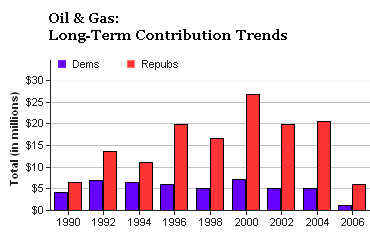 A Prius in Every Pot by Maureen Dowd The New York Times April 26, 2006 It's taken over five years, but George W. Bush finally made a concession speech to Al Gore. He conceded that America needs to conserve, by buying hybrid vehicles and developing new energy sources. Trying to calm the yips in his party and the country over exploding gasoline prices, the president sounded a bit like a wild-eyed Ozone Man himself yesterday, extolling the virtues of alternative fuel derived from cooking grease, sugar, grass, wood chips, soybean oil and corn. But then he got ahold of himself. "You just got to recognize there are limits to how much corn can be used for ethanol," he said, standing in front of a bucolic mural. "After all, we got to eat some." You could run a fleet of S.U.V.'s on the gas that W. was spewing about fuel. Bill Clinton would have been more likely to crack down on fast food than W. and Dick Cheney would be to crack down on Big Oil. Even the usually supportive Wall Street Journal editorial page chastised Republicans for putting on "Chuck Schumer and Nancy Pelosi fright wigs" to shout about corporate greed and market manipulation. W.'s big move was to ever so slightly beef up a federal investigation into oil company price manipulation that's been under way since Katrina. "It's a great idea," said the Democratic leader, Senator Harry Reid. "So good that we passed a law last year calling for that." Price manipulation could explain the marginal -- why gas went from, say, $2.70 to $2.90 -- but not why gas went from $1.40 to $2.70. That's more about fundamental forces: Chinese and Indian demand, markets spooked by Iran's threats, Nigeria's unrest, Venezuela's talk of nationalizing its oil industry, and the Pentagon's bungling of the restoration of Iraq's infrastructure. Gasoline prices may be hurting average folks, but the oilers who helped put the Boy King and the Duke of Halliburton in office with lavish donations are enjoying record profits and breathtaking bonuses. The Oilmen in the Oval, incompetent in so many ways, have brilliantly achieved one of their main objectives: boosting the fortunes of the oil industry and the people who run it. All those secret meetings the vice president had back in 2001, letting the energy and oil big shots help write our energy policy -- one that urged more oil and gas drilling -- worked like a charm. In all their years in government, Mr. Cheney and the Bushes have never done anything to hold the oil companies' feet to the fire, or get Americans' feet off the gas pedal. As Representative James Clyburn, Democrat of South Carolina, noted, "The Republicans are the party with the keys to the executive washrooms of Halliburton, Exxon and the big oil corporations." Consider Lee Raymond, the recently retired chairman and chief executive of Exxon. Recently, we learned about his stunning secret compensation: he got more than $686 million from 1993 to 2005, according to a Times story, which calculated: "That is $144,573 for each day he spent leading Exxon's 'God pod,' as the executive suite at the company's headquarters in Irving, Tex., is known." The only oil baron who isn't cashing in these days is Saddam. We pulled up to the pump in Baghdad and plunked down $10 billion a month, and we're still not getting any gas out of it. Instead of easing our oil dependence and paying for Iraq's reconstruction, the bungled invasion and subsequent nuclear sparring with Iran have left even Republicans looking for Priuses. The last time W. began wringing his hands about our addiction to oil -- in the State of the Union address -- the vice president was dismissive about the notion of sacrifice afterward. And the energy secretary clarified the president's words, saying they shouldn't be taken literally and that the idea of replacing Middle East oil imports with alternative fuels was "purely an example." Even if W. shows up on TV in a gray cardigan, it's patently preposterous for the Republicans to make this argument, after selling us on the idea that it's our manifest destiny to get into giant cars and go to giant Wal-Marts and giant Targets and buy more giant bags of stuff. Now they're telling us to squeeze into tiny electric cars and compete for precious drips of oil with the Chinese and Indians who are swimming in enough of our dollars to afford cars. The U.S. could have begun developing alternative fuels 30 years ago if Dick Cheney hadn't helped scuttle an ambitious plan in the Ford administration. By the time these guys get gas from cooking grease, global warming will have us cooked. 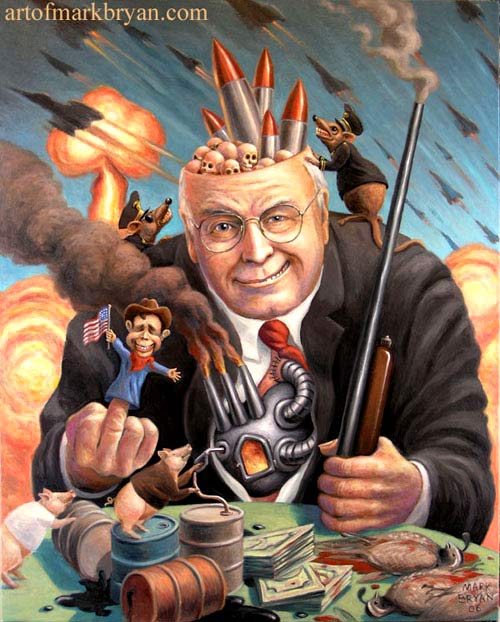 Cheney's Snarl Barry Yourgrau Sun Apr 23, 4:26 PM ET In an op-ed piece in the Baltimore Sun today, Lawrence Wilkerson, Sec. Powell's former chief of staff, asks the important question: "Is U.S. being transformed into a radical republic?" He gets the tense wrong; but his answer is correct. His answer is yes. However, his catalogue of extremisms and radicalisms (so many Neo-Con inspired) makes a glaring omission: Namely, that we now have a government that operates by systematic lying. Call it spin, call it selective use of whatever intelligence. Call it by its true name: propaganda. As Paul Krugman has been pointing out since Bush opened his mouth back debating Gore, there is practically zero information from George W or his administration that can be relied on as factual. Does any exist? Can you imagine if Bush or Cheney were, say, your doctor? Can you image what kind of informed opinion you'd receive? The kind of medical care based on that opinion? Everything with this Presidential seal is spin or fabrication or distortion. Yes, all governments lie. But this government does it on a scale that is radical and then some. Whatever this is, it ain't good old-fashioned democracy. Recognition of this propaganda angle is entirely missing from Francis Fukuyama's disavowal of his Neo-Con cohorts. Any critique of Bush's conduct of preemptive/preventive war is deficient if it does not acknowledge that this government waged a bogus preventive/preemptive war. Not just an illegal "preemptive/preventative" war. A bogus one. In good part to provide propaganda resources for the President's use in domestic politics. No, it ain't good old democracy. Furthermore, as scholar Susan Douglas points out astutely: "One of the deep consequences of the relentless Bush propaganda is that millions of people now struggle daily to figure out what actually are facts and what is spin. In this environment, everything is spin, and laws and facts are cast as debatable, mere opinions. Everything is partisan, everything "framed."' In other words, a corruption of a sense of public reality, really. Jeez Louise. Historian RJB Bosworth writes in his exhaustive new study, Mussolini's Italy: "The Fascist dictatorship is often best understood as a 'propaganda state', where nothing was what is was said to be..." Am I shouting "fascism"? Do I have to? Isn't "radical" and "not good ole democracy" enough? Dick Cheney, that 5-star propagandist, has a little mannerism he likes to throw into his pronouncements: count the times he'll introduce a whopper or a whopper-cum-slander with the oh so modest little qualifier: "If you will." A nice little rhetorical touch of diffidence, as if he was being Mr. Reasonable himself. And not some mendacious monstrosity sprung from the frames of Dr. Strangelove. But that fixed droopy snarl of Cheney's betrays him. Malcolm Gladwell in Blink talks of how everyone gives facial or physical clues of what they're really feeling, despite their words. These clues might last a split second, but we do see them; most of us just choose to ignore them. But how can you ignore what's plastered half the time on Dick Cheney's face? 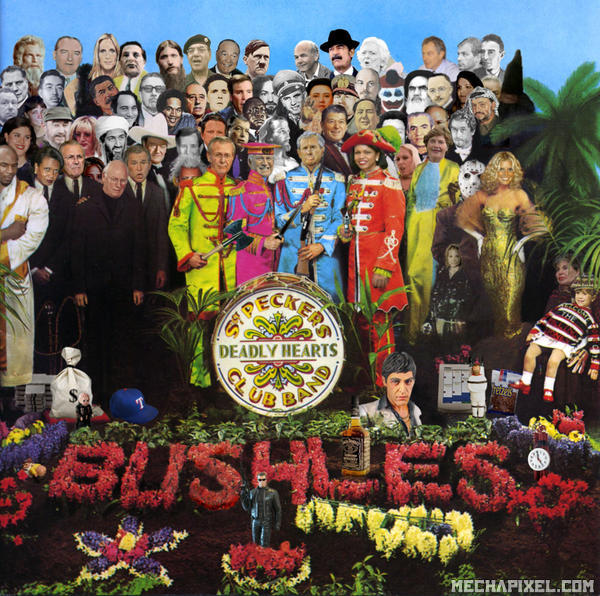 L.A. Times calls for Dick Cheney's early retirement Monday Apr 24 09:09 AEST A Los Angeles Times editorial on Sunday called for a "far more audacious" makeover of President George W. Bush's administration, saying he should send Vice President Dick Cheney into early retirement. Earlier this week, Bush Press Secretary Scott McClellan resigned and Karl Rove gave up his policy role as part of a White House sweep aimed at reviving Bush's sagging job-approval ratings ahead of November's pivotal mid-term elections. "The remaking of the president in the public eye likely will require more than last week's game of musical chairs," the editorial said. "Bush has acknowledged that he has spent much of his political capital on Iraq, and the way to replenish the reserves is to replace the officials most associated with the overreaching that led to the tragedy in Iraq -- and with the administration's broader disdain for diplomacy." The paper noted broad speculation that Treasury Secretary John Snow will likely be ushered out next, but said a better solution would include the resignation of Defense Secretary Donald Rumsfeld -- whose critics, including retired generals, have demand that he step aside -- and Cheney's ouster. "Throwing Cheney overboard would be an implicit repudiation of the excessively hawkish foreign policy with which the vice president, even more than Rumsfeld, has been associated," the paper said. Cheney told CBS television's "Face the Nation" on March 19 he had no intention of resigning. "I didn't ask for this job. I didn't campaign for it. I got drafted," Cheney said. "I've now been elected to a second term," he told CBS. "I'll serve out my term." Unlike most vice presidents, Cheney does not aspire to be president, the editorial said, so he would not be giving up a political birthright by agreeing to retire due to health reasons or concern over the publicity surrounding the trial of his former chief of staff, I. Lewis 'Scooter' Libby. "No longer proclaiming 'mission accomplished,' Bush has been pursuing a sadder-but-wiser policy in Iraq that many Democrats also endorse," the paper said. "Having changed his tune, the president should also think about changing the company he keeps."  Cheney takes a nap. “Vice President Dick Cheney gets caught napping yesterday as Defense secretary Donald Rumsfeld and other White House aides leave a press briefing by President Bush and Chinese leader Hu Jintao. The veep’s people later insisted he was reading his notes.”  Cheney has tapped Iranian expatriate, arms dealer to surveil discussions with Iran, officials say 04/20/2006 @ 12:47 pm Filed by Larisa Alexandrovna The Department of Defense and Vice President Dick Cheney have retained the services of Iran-Contra arms dealer and discredited intelligence asset Manucher Ghorbanifar as their “man on the ground,” in order to report on any interaction and attempts at negotiations between Iranian officials and US ambassador to Iraq, Zelmay Khalilzad, current and former intelligence officials say. Speaking on condition of anonymity, three intelligence sources identified the Iran-Contra middleman as having been put back on the payroll, acting as a human intelligence asset and monitoring any movement in discussions about Iran’s alleged burgeoning nuclear weapons program. “Khalilzad has been authorized to enter into discussions with the Iranians over the issue of stability inside Iraq,” one former intelligence source said. These discussions, however, are now on hold for unspecified reasons. Sources close to the UN Security Council and a former high ranking intelligence official say that this latest failed attempt to bring Iran to the table is part of an ongoing attempt by Cheney and Rumsfeld to squash diplomatic activities. Another intelligence source confirmed the spiking of diplomatic action on Cheney’s behalf, explaining that the Bush administration sees such talks as a “sign of weakness.” Asked if Ghorbanifar was essentially being employed as a spy, one former senior counterintelligence official said, "You could put it that way." A former high ranking state department official, however, doubted that the Office of the Vice President would employ Ghorbanifar directly. “In my experience it would be highly unusual and even extraordinary if the Office of the Vice President would have such activities,” the ex-State Department official said. Yet the source added that the current Vice Presidency is in itself “unusual” and “extraordinary.” Cheney’s office did not return calls seeking comment for this article. As reported by RAW STORY last Thursday, the Defense Department has created a special operations arm of various Iranian dissidents, using terror group Mujahedeen-e Khalq to conduct operations on the ground in Iran. According to current and former intelligence officials, the latest revelations of Ghorbanifar’s involvement again illustrate that Cheney and the Pentagon continue to work on the periphery of protocol in order to bypass US intelligence agencies and resources. Reports of the Bush administration’s interest in meeting with Iranian officials continue to suggest that it is Iran that is pushing back against diplomatic talks. Yet all three intelligence sources and sources close to the UN Security Council say it is the US that is squashing attempts at talks between the two nations. Earlier this month, for example, the New York Times reported that Iran’s UN Ambassador, Javad Zarif, wanted discussions. In a New York Times op-ed, Zarif contended that Iran is committed to nuclear nonproliferation and eager for talks. House Intelligence Committee Chairman Peter Hoekstra (R-MI) approved using Ghorbanifar as an intermediary, intelligence sources say. Hoekstra attended at least one meeting in Paris with Curt Weldon and Harold Rhode to meet with Ghorbanifar. “Hoekstra okayed these channels,” one intelligence source said. “He gave his blessing.” In response to an email from RAW STORY, the House Intelligence Committee’s Republican spokesman Jamal Ware said he was out of the office and unable to discuss this issue with Congressman Hoekstra, adding: it was “doubtful we would have a comment either way.” Iran Contra middleman If these allegations are true, Ghorbanifar’s recruitment reinstates him to a position he held during the Iran Contra affair, when he was implicated in the scandal of selling arms to Iran in order to fund a right wing terrorist group, the Contras, who were battling the democratically-elected Sandinista government in Nicaragua. Ghorbanifar was also present at discussions in Rome in 2001 – talks which have received much attention because they were attended by Pentagon and Iranian officials. According to neoconservative Michael Ledeen, who participated in the talks, the topic was Iran. A second set of meetings later took place in Paris. “The Rome meetings had nothing whatsoever to do with Iraq, but with Iran and Afghanistan," Ledeen told RAW STORY. In an exclusive interview with Newsweek late last year, Ghorbanifar stated that the meetings in Rome and Paris were about regime change in Iran. The meetings included Larry Franklin, a Pentagon Iran analyst who has been convicted for passing secrets to an Israeli lobby, and Harold Rhode, a Defense Department consultant also under investigation in the case. “Ghorbanifar, a former Iranian spy who helped launch the Iran-contra affair, says one of the things he discussed with Defense officials Harold Rhode and Larry Franklin at meetings in Rome in December 2001 (and in Paris last June with only Rhode) was regime change in Iran,” Newsweek wrote. Ledeen says that Ghorbanifar’s role in the Rome meeting he attended was that of “occasional translator” and “organizer”. “Please note, once again, that Ghorbanifar was not an active participant in the December, 2001, meetings in Rome,” says Ledeen. “In all the discussions I attended, there was no discussion of Iraq; we talked about Iran, and particularly about Iran's activities in Afghanistan, aimed at American forces there,” he added. “Ghorbanifar has never made a secret of his desire to rid his country of the mullahs' tyranny,” Ledeen continued. “He has said that constantly since the first day I met him, in 1985. It shouldn't surprise anyone to hear that he may have spoken about that with US Government officials, in Rome and elsewhere. But if that happened, it was outside the meetings I attended.” As previously reported by RAW STORY, the Paris meetings, which were also attended by Congressman Curt Weldon (R-PA) on at least two occasions in the spring of 2003, involved attempts by Ghorbanifar to advance false intelligence in order to implicate Iran in a bizarre uranium theft claim. The assertions were debunked by the CIA and by other US intelligence and military experts. According to two of the three intelligence sources, the arms dealer was brought in to observe attempts by Khalilzad or Iranian officials at diplomatic activities and report back to Rumsfeld and/or Cheney through whomever is “holding” Ghorbanifar, sources say. 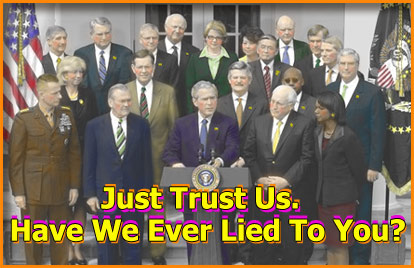 Cheney Tax Return Shows Katrina Tax Benefits for Non-Katrina Charitable Contributions Michael Kirsch (Notre Dame) points out an interesting aspect of the Vice-President's 2005 tax return: It appears that the VP is a major beneficiary of the Hurricane Katrina tax relief act. In particular, he claimed $6.8 million of charitable deductions, which is 77% of his AGI -- well in excess of the 50% limitation that would have applied absent the Katrina legislation. The press release indicates that the charitable contribution reflects the amount of net proceeds from an independent administrator's exercise of the VP's Halliburton options -- apparently, the VP had agreed back in 2001 that he would donate the net proceeds from the options to charities once they were exercised. The press release seems to confirm, at least implicitly, the VP's efforts to take advantage of the Katrina legislation -- it mentions that the Cheneys wrote a personal check of $2.3 million to the administrator in December in order to "maximize the charitable gifts in 2005." Admittedly, I don't know anything about the transactions beyond the info in the press release, but my gut reaction is that the personal check was given in order to make sure the independent administrator had sufficient liquid assets to pay all of the promised charitable contributions before the 50% limit returned on 1/1/06. Despite the importance of the Katrina legislation to his tax return, it looks like none of the charitable contributions actually went to Katrina-related charities (the press release lists the 3 charitable recipients, all of which were designated in the original 2001 gift agreement). While there's nothing inappropriate about that from a legal perspective, it does demonstrate how the legislation, which was sold to the public as providing relief to Katrina victims, provided significant tax benefits to the VP (and potentially other wealthy individuals) in situations that have nothing to do with Hurricane Katrina. 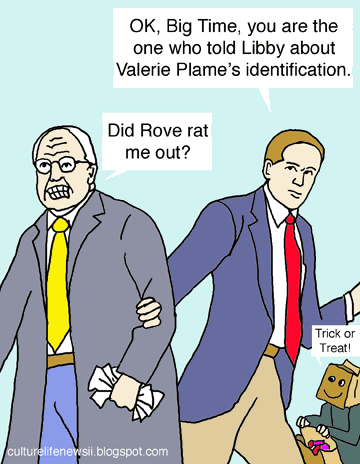 Maestro Cheney: Seven Days in July Jeralyn Merritt Sat Apr 15, 11:25 PM ET Intrepid reporter Murray Waas has new disclosures in the Valerie Plame investigation. Not only did Cheney authorize Libby to leak details of the NIE report, he also authorized him to leak information in the still classified March, 2002 CIA debriefing of Joseph Wilson conducted after his trip to Niger. Murray writes: President Dick Cheney directed his then-chief of staff, I. Lewis "Scooter" Libby, on July 12, 2003 to leak to the media portions of a then-highly classified CIA report that Cheney hoped would undermine the credibility of former Ambassador Joseph C. Wilson, a critic of the Bush administration's Iraq policy, according to Libby's grand jury testimony in the CIA leak case and sources who have read the classified report. The March 2002 intelligence report was a debriefing of Wilson by the CIA's Directorate of Operations after Wilson returned from a CIA-sponsored mission to Niger to investigate claims, later proved to be unfounded, that Saddam Hussein had attempted to procure uranium from the African nation, according to government records. Murray also picks up on this nugget in Fitzgerald's April 5 filing (pdf) responding to Libby's request for documents: At some point after the publication of the July 6, 2003 Op Ed by Mr. Wilson, Vice President Cheney, defendant's immediate superior, expressed concerns to defendant regarding whether Mr. Wilson's trip was legitimate or whether it was in effect a junket set up by Mr. Wilson's wife. Up until now, focus generally has centered on Libby and Cheney's June conversations. Murray writes that the July conversation occurred "within days" of July 6th. The exact date is uncertain, but it could be as early as July 7, one day before Libby and Miller's meeting on July 8 during which Libby reportedly shared with her details of the NIE and CIA reports. According to the Indictment, Libby told the grand jury he did not discuss Valerie Wilson with Miller on July 8 and that he first learned of Valerie Wilson's employment from a reporter, probably on July 10th when he heard it from NBC's Tim Russert. He claims to have forgotten that he learned about it from Cheney in June. But the Indictment charges that Libby did tell Miller about Valerie Wilson that date. During this discussion, LIBBY advised Miller of his belief that Wilson's wife worked for the CIA. (Par. 17.) Libby told Fitzgerald and the grand jury of his efforts to make sure he had adequate authorization for disclosing portions of the NIE report to Miller on July 8. Fitzgerald wrote in his April 5 filing (corrected version): Defendant testified that he thought he brought a brief abstract of the NIE's key judgments to the meeting with Miller on July 8. Defendant understood that he was to tell Miller, among other things, some of the key judgments of the NIE and that the NIE stated that Iraq was "vigorously trying to procure" uranium. Defendant testified that this July 8th meeting was the only time he recalled in his government experience when he disclosed a document to a reporter that was effectively declassified by virtue of the President's authorization that it be disclosed. Defendant testified that one of the reasons why he met with Miller at a hotel was the fact that he was sharing this information with Miller exclusively. In fact, on July 8, defendant spoke with Miller about Mr. Wilson after requesting that attribution of his remarks be changed to "former Hill staffer." Defendant discussed with Miller the contents of a then classified CIA report which defendant characterized to Miller as having been written by Wilson. Defendant advised Miller that Wilson had reported that he had learned that in 1999 an Iraqi delegation visited Niger and sought to expand commercial relations, which was understood to be a reference to a desire to obtain uranium. Later during the discussion about Wilson and the NIE, defendant advised Miller of his belief that Wilson's wife worked at the CIA. Indict., Count One, ¶ 17. Wilson was not the author of the CIA report, and the report does not mention his wife, Valerie Wilson, but that's not the point. It was a report of Wilson's debriefing after he returned from Africa. Would Libby, who was so careful about checking and rechecking the declassification status of the NIE report, and who had been told by Cheney to reveal the CIA report, really have disclosed information about Joseph Wilson's wife on his own initiative? Jane at Firedoglake has more on this. If it did not take place on July 7, Cheney and Libby's July conversation could have occurred as late as July 12, when Cheney, Libby and Cathie Martin took their now infamous plane trip to Norfolk on Air Force Two. Again, according to Fitzgerald's April 5 filing, Libby acknowledged being asked by Cheney on July 12 to publicly refute Joseph Wilson's op-ed to the media. Normally this would have been Cathie Martin's job. ....Defendant further testified that on July 12, 2003, he was specifically directed by the Vice President to speak to the press in place of Cathie Martin (then the communications person for the Vice President) regarding the NIE and Wilson. Defendant was instructed to provide what was for him an extremely rare "on the record" statement, and to provide "background" and "deep background" statements, and to provide information contained in a document defendant understood to be the cable authored by Mr. Wilson. Cheney and Libby were both on the plane. It was after the plane returned to Washington that Libby returned a telephone call to Matthew Cooper and spoke again with Judith Miller, and in both conversations, allegedly discussed not only Joseph Wilson but Valerie Wilson and her role in sending her husband to Niger. Cooper describes his version of the conversation, which occurred at 3:00 pm, in the Nov. 17, 2005 issue of Time. Fitz describes the importance of the conversations with Cooper and Miller in his April 5 filing: During the conversations that followed on July 12, defendant discussed Ms. Wilson's employment with both Matthew Cooper (for the first time) and Judith Miller (for the third time). Even if someone else in some other agency thought that the controversy about Mr. Wilson and/or his wife was a trifle, that person's state of mind would be irrelevant to the importance and focus defendant placed on the matter and the importance he attached to the surrounding conversations he was directed to engage in by the Vice President. To sum up, I think there are three points to focus on in Murray's new article. Taken together they suggest to me that between July 6 and July 13, Cheney directed Libby not only to disclose the contents of previously classified documents to selected reporters, but also to leak information about Valerie Plame Wilson, her employment with the CIA and her purported role in the CIA's decision to send her husband to Niger. How differently Libby acted before disclosing details of the NIE and the CIA report as compared to leaking details about Joseph and Valerie Wilson. With the first two, he went through great machinations to make sure he had authorization. But he wants us to believe that if he disclosed information on Valerie Wilson, he did so on his own, almost on a whim. This man did nothing on a whim. The inference to be made is that Cheney directed him to leak about Valerie Wilson the same as he did details in the NIE report and CIA reports. The coincidental timing of the July 12 plane ride to Norfolk with Libby, Cheney and Martin aboard and the phone calls later that day with Matt Cooper and Judith Miller. On the plane, there is discussion of a media plan to react to Wilson's July 6 New York Times op-ed. Right afterwards, Libby tells Miller and Cooper about Valerie Plame Wilson. Is it realistic that Cheney didn't know about or direct Libby's disclosures to Cooper and Miller that date? The news of the second coversation between Libby and Cheney, occurring after July 6 and before July 13. In addition to supporting an inference Cheney directed Libby to disclose details about the Wilsons on July 12, doesn't this undercut Libby's lack of memory defense and his insistence that by July, he had forgotten what Cheney had told him in June? Are we also supposed to believe he forgot what Cheney told him during seven days in July?  Fans toss out boos at Cheney BY ZACHARY R. DOWDY AND CRAIG GORDON Newsday Staff Writers April 12, 2006 The boos that met Vice President Dick Cheney yesterday as he tossed out the first ball for the Washington Nationals' home opener against the New York Mets may reflect a greater discontent with his off-diamond performance than his pitching form.  Cheney walked onto the field flanked by three veterans of the wars in Iraq and Afghanistan, but the soldiers' support failed to lift Cheney's ratings - or his pitch - which was more a grounder than a fastball. It reached catcher Brian Schneider after a bounce. While there were some cheers from the crowd, the chorus of dissatisfaction comes as polls show Americans giving a collective thumbs-down to Cheney's and President George W. Bush's performance during their second term in office. Cheney met Marine Cpl. Jamel Daniels of New York City, Army Spc. Javier Torres of Queens and Staff Sgt. Derek L. Drew of Goldsboro, N.C., for the first time yesterday before walking onto the field. All three were awarded the Purple Heart for combat injuries. Daniels was injured on a routine patrol in Iraq while deployed with the 2nd Battalion of the 2nd Marine Division. Torres, an infantryman from Queens, was wounded during a foot patrol in Kandahar, Afghanistan, while serving with the 508th Airborne, 173rd Airborne Division. Drew was injured on a peace-keeping mission north of Baghdad while serving with the 4th Battalion, 1st Field Artillery. The three were honored as part of a program by the Nationals called "America Supports You." Daniels was wounded by an improvised explosive device that struck the Humvee he was riding in, killing some of his colleagues. Now, he walks with the help of a prosthetic leg. Previously, he told the Wilmington (N.C.) Star News that the vision of a plane flying into the World Trade Center on Sept. 11, 2001, inspired him to enlist. He said, "Every day I open my eyes I count my blessings to be here."  Specter: Bush, Cheney should explain CIA leak Associated Press Published April 10, 2006 WASHINGTON -- President Bush and Vice President Dick Cheney should speak publicly about their involvement in the CIA leak case, a leading Republican senator said Sunday. "We ought to get to the bottom of it so it can be evaluated, again, by the American people," said Sen. Arlen Specter of Pennsylvania, chairman of the Senate Judiciary Committee. In a federal court filing last week, the prosecutor in the case said Cheney's former chief of staff, Lewis "Lewis" Libby, testified before a grand jury that he was authorized by Bush, through Cheney, to leak information from a classified document that detailed intelligence agencies' conclusions about weapons of mass destruction in Iraq. Bush is not accused of doing anything illegal. As president he is authorized to declassify secret information. "The president may be entirely in the clear," Specter told "Fox News Sunday." But, he added, "it was not the right way to go about it because we ought not to have leaks in government."  Cheney Aide Says Bush OK'd Leak By PETE YOST, Associated Press Writer WASHINGTON - Vice President Dick Cheney's former top aide told prosecutors President Bush authorized the leak of sensitive intelligence information about Iraq, according to court papers filed by prosecutors in the CIA leak case. Before his indictment, I. Lewis Libby testified to the grand jury investigating the CIA leak that Cheney told him to pass on information and that it was Bush who authorized the disclosure, the court papers say. According to the documents, the authorization led to the July 8, 2003, conversation between Libby and New York Times reporter Judith Miller. There was no indication in the filing that either Bush or Cheney authorized Libby to disclose Valerie Plame's CIA identity. But the disclosure in documents filed Wednesday means that the president and the vice president put Libby in play as a secret provider of information to reporters about prewar intelligence on Iraq. The authorization came as the Bush administration faced mounting criticism about its failure to find weapons of mass destruction in Iraq, the main reason the president and his aides had given for going to war. Libby's participation in a critical conversation with Miller on July 8, 2003 "occurred only after the vice president advised defendant that the president specifically had authorized defendant to disclose certain information in the National Intelligence Estimate," the papers by Special Counsel Patrick Fitzgerald stated. The filing did not specify the "certain information." "Defendant testified that the circumstances of his conversation with reporter Miller — getting approval from the president through the vice president to discuss material that would be classified but for that approval — were unique in his recollection," the papers added. Libby is asking for voluminous amounts of classified information from the government in order to defend himself against five counts of perjury, obstruction and lying to the FBI in the Plame affair. He is accused of making false statements about how he learned of Plame's CIA employment and what he told reporters about it. Her CIA status was publicly disclosed eight days after her husband, former U.S. Ambassador Joseph Wilson, accused the Bush administration of twisting prewar intelligence to exaggerate the Iraqi threat from weapons of mass destruction. In 2002, Wilson had been dispatched to Africa by the CIA to check out intelligence that Iraq had an agreement to acquire uranium yellowcake from Niger, and Wilson had concluded that there was no such arrangement. Libby says he needs extensive classified files from the government to demonstrate that Plame's CIA connection was a peripheral matter that he never focused on, and that the role of Wilson's wife was a small piece in a building public controversy over the failure to find WMD in Iraq. Fitzgerald said in the new court filing that Libby's requests for information go too far and the prosecutor cited Libby's own statements to investigators in an attempt to limit the amount of information the government must turn over to Cheney's former chief of staff for his criminal defense. According to Miller's grand jury testimony, Libby told her about Plame's CIA status in the July 8, 2003 conversation that took place shortly after the White House aide — according to the new court filing — was authorized by Bush through Cheney to disclose sensitive intelligence about Iraq and WMD contained in a National Intelligence Estimate. The court filing was first disclosed by The New York Sun. |